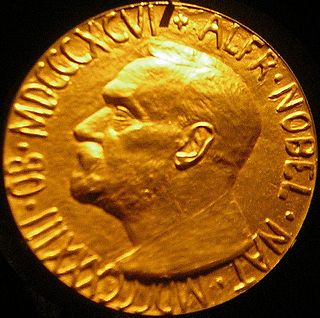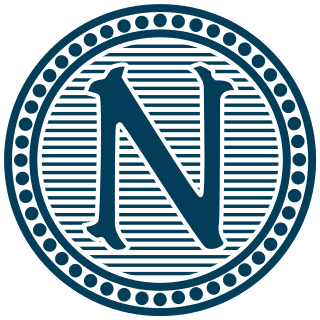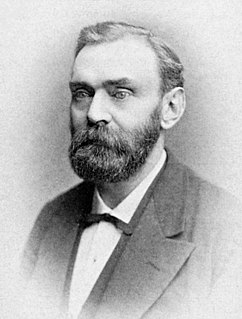 W
WThe Nobel Prize are five separate prizes that, according to Alfred Nobel's will of 1895, are awarded to "those who, during the preceding year, have conferred the greatest benefit to humankind." Alfred Nobel was a Swedish chemist, engineer, and industrialist most famously known for the invention of dynamite. He died in 1896. In his will, he bequeathed all of his "remaining realisable assets" to be used to establish five prizes which became known as "Nobel Prizes." Nobel Prizes were first awarded in 1901.
 W
WThe Nobel Prize in Chemistry is awarded annually by the Royal Swedish Academy of Sciences to scientists in the various fields of chemistry. It is one of the five Nobel Prizes established by the will of Alfred Nobel in 1895, awarded for outstanding contributions in chemistry, physics, literature, peace, and physiology or medicine. This award is administered by the Nobel Foundation, and awarded by the Royal Swedish Academy of Sciences on proposal of the Nobel Committee for Chemistry which consists of five members elected by the Academy. The award is presented in Stockholm at an annual ceremony on 10 December, the anniversary of Nobel's death.
 W
WThe Nobel Prize in Literature is a Swedish literature prize that is awarded annually, since 1901, to an author from any country who has, in the words of the will of Swedish industrialist Alfred Nobel, "in the field of literature, produced the most outstanding work in an idealistic direction". Though individual works are sometimes cited as being particularly noteworthy, the award is based on an author's body of work as a whole. The Swedish Academy decides who, if anyone, will receive the prize. The academy announces the name of the laureate in early October. It is one of the five Nobel Prizes established by the will of Alfred Nobel in 1895. Literature is traditionally the final award presented at the Nobel Prize ceremony. On some occasions the award has been postponed to the following year, most recently in 2018.
 W
WThe Nobel Peace Prize is one of the five Nobel Prizes established by the will of Swedish industrialist, inventor, and armaments manufacturer Alfred Nobel, along with the prizes in Chemistry, Physics, Physiology or Medicine, and Literature. Since March 1901, it has been awarded annually to those who have "done the most or the best work for fraternity between nations, for the abolition or reduction of standing armies and for the holding and promotion of peace congresses".
 W
WThe Nobel Prize in Physics is a yearly award given by the Royal Swedish Academy of Sciences for those who have made the most outstanding contributions for mankind in the field of physics. It is one of the five Nobel Prizes established by the will of Alfred Nobel in 1895 and awarded since 1901; the others being the Nobel Prize in Chemistry, Nobel Prize in Literature, Nobel Peace Prize, and Nobel Prize in Physiology or Medicine. Physics is traditionally the first award presented in the Nobel Prize ceremony.
 W
WThe Nobel Prize in Physiology or Medicine is awarded yearly by the Nobel Assembly at the Karolinska Institute for outstanding discoveries in physiology or medicine. The Nobel Prize is not a single prize, but five separate prizes that, according to Alfred Nobel's 1895 will, are awarded "to those who, during the preceding year, have conferred the greatest benefit to humankind”. Nobel Prizes are awarded in the fields of Physics, Chemistry, Physiology or Medicine, Literature, and Peace.
 W
WThe Royal Swedish Academy of Sciences is one of the royal academies of Sweden. Founded on 2 June 1739, it is an independent, non-governmental scientific organization which takes special responsibility for promoting the natural sciences and mathematics and strengthen their influence in society, whilst endeavouring to promote the exchange of ideas between various disciplines.
 W
WThe Stock Exchange Building is a building originally erected for the Stockholm Stock Exchange between 1773 and 1778 from construction drawings by Erik Palmstedt. The stock exchange moved out of the building completely in 1998. It is located on the north side of the square Stortorget in Gamla stan, the old town in central Stockholm, Sweden, and owned by the city council. Since 1914 it has been the home of the Swedish Academy, which uses the building for its meetings, such as those at which it selects and announces the name of the recipient of the Nobel Prize for Literature. The building also houses the Nobel Museum and the Nobel Library.
 W
WThe Nobel Prize is a set of five different prizes that, according to its benefactor Alfred Nobel, in his 1895 will, must be awarded "to those who, during the preceding year, have conferred the greatest benefit to humankind”. The five prizes are awarded in the fields of Physics, Chemistry, Physiology or Medicine, Literature, and Peace.
 W
WThe Golden Hall is a banqueting hall in Stockholm City Hall. Measuring 44-metre (144 ft) in length, it received its name when its walls were decorated by mosaics created by the artist Einar Forseth on a proposal by the City Hall architect Ragnar Östberg. The hall is best known as the location of the ball after the annual Nobel Banquet in the City Hall's Blue Hall.
 W
WThe Lindau Nobel Laureate Meetings are annual scientific conferences held in Lindau, Bavaria, Germany, since 1951. Their aim is to bring together Nobel laureates and young scientists to foster scientific exchange between different generations, cultures and disciplines. The meetings assume a unique position amongst international scientific conferences, as from 30 to 65 Nobel laureates attending each edition they are the largest regular congregation of Nobel laureates in the world, apart from the Nobel Prize award ceremony in Stockholm.
 W
WCarl Albert Lindhagen was a Swedish lawyer, politician, and pacifist.
 W
WThis is a list of memorials to George C. Marshall (1880–1959), former secretary of state, secretary of defense, and Nobel Peace Prize laureate.
 W
WThe Michael Nobel Energy Award is a proposed prize announced in 2007 by some members of the Nobel family and the Nobel Charitable Trust. It would award innovations in alternative energy technology. It has not yet been awarded. The prize would be awarded by the Nobel Charitable Trust and not by the Nobel Foundation, the organization that awards the Nobel Prizes.
 W
WA Nobel Committee is a working body responsible for most of the work involved in selecting Nobel Prize laureates. There are five Nobel Committees, one for each Nobel Prize.
 W
WThe Nobel Foundation is a private institution founded on 29 June 1900 to manage the finances and administration of the Nobel Prizes. The Foundation is based on the last will of Alfred Nobel, the inventor of dynamite.
 W
WThe Nobel Prize Museum is located in the former Stock Exchange Building (Börshuset) on the north side of the square Stortorget in Gamla Stan, the old town in central Stockholm, Sweden. The Nobel Prize Museum showcases information about the Nobel Prize and Nobel prizewinners, as well as information about the founder of the prize, Alfred Nobel (1833–1896). The museum's permanent display includes many artifacts donated by Nobel Laureates, presented together with personal life stories.
 W
WAlfred Bernhard Nobel was a Swedish chemist, engineer, inventor, businessman, and philanthropist. He is best known for having bequeathed his fortune to establish the Nobel Prize, though he also made several important contributions to science, holding 355 patents in his lifetime. Nobel's most famous invention was dynamite, a safer and easier means of harnessing the explosive power of nitroglycerin; it was patented in 1867 and was soon used worldwide for mining and infrastructure development.
 W
WThe Prize is a novel written by Irving Wallace in 1962 concerning the annual prize-giving ceremony of the Nobel Prize. A film, based on the book and starring Paul Newman, was made later in 1963. Six people all around the world are catapulted to international fame as they receive the most important telegraph of their lives, which invites them to Stockholm to receive the prize. This will be a turning point in their lives, in which personal affairs and political intrigue will engulf every one of the characters.
 W
WRagnar Sohlman was a Swedish chemical engineer, manager, civil servant, and creator of the Nobel Foundation.
 W
WStockholm City Hall is the seat of Stockholm Municipality in Stockholm, Sweden. It stands on the eastern tip of Kungsholmen island, next to Riddarfjärden's northern shore and facing the islands of Riddarholmen and Södermalm. It houses offices and conference rooms as well as ceremonial halls. It is the venue of the Nobel Prize banquet and is one of Stockholm's major tourist attractions.
 W
WThe Stockholm Concert Hall is the main hall for orchestral music in Stockholm, Sweden.
 W
W W
W W
W W
W W
W W
W